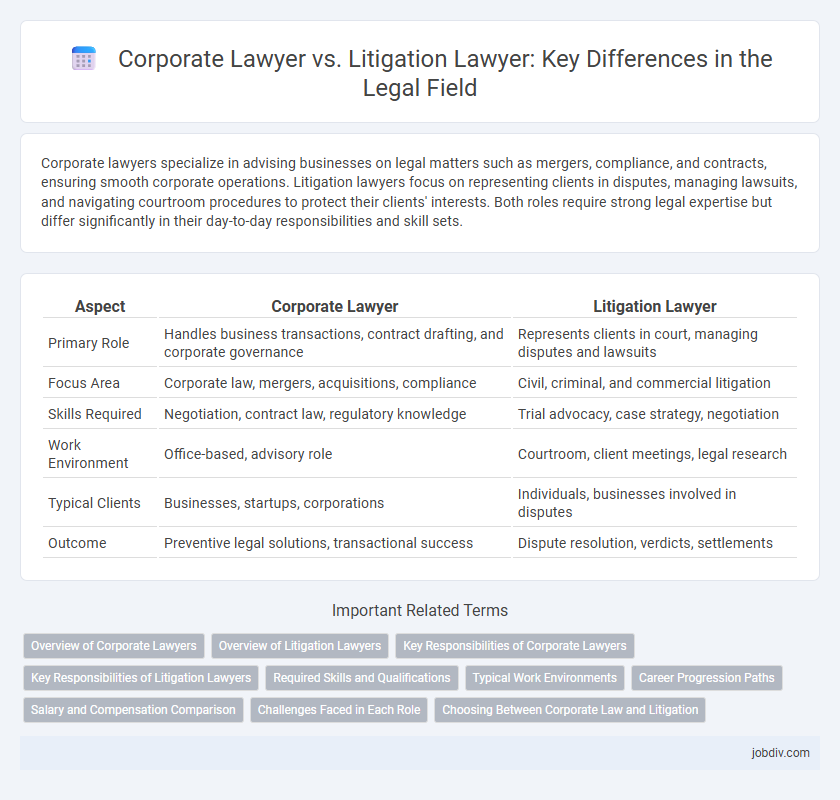Corporate lawyers specialize in advising businesses on legal matters such as mergers, compliance, and contracts, ensuring smooth corporate operations. Litigation lawyers focus on representing clients in disputes, managing lawsuits, and navigating courtroom procedures to protect their clients' interests. Both roles require strong legal expertise but differ significantly in their day-to-day responsibilities and skill sets.
Table of Comparison
| Aspect | Corporate Lawyer | Litigation Lawyer |
|---|---|---|
| Primary Role | Handles business transactions, contract drafting, and corporate governance | Represents clients in court, managing disputes and lawsuits |
| Focus Area | Corporate law, mergers, acquisitions, compliance | Civil, criminal, and commercial litigation |
| Skills Required | Negotiation, contract law, regulatory knowledge | Trial advocacy, case strategy, negotiation |
| Work Environment | Office-based, advisory role | Courtroom, client meetings, legal research |
| Typical Clients | Businesses, startups, corporations | Individuals, businesses involved in disputes |
| Outcome | Preventive legal solutions, transactional success | Dispute resolution, verdicts, settlements |
Overview of Corporate Lawyers
Corporate lawyers specialize in advising businesses on legal matters related to corporate governance, mergers and acquisitions, compliance, and contract negotiation. Their expertise ensures that companies operate within the legal framework, minimizing risks and facilitating smooth transactions. Unlike litigation lawyers who focus on dispute resolution in courts, corporate lawyers prioritize preventive legal strategies to protect business interests.
Overview of Litigation Lawyers
Litigation lawyers specialize in representing clients in court cases, managing disputes through trial and other legal proceedings. Their expertise includes drafting pleadings, conducting discovery, and arguing motions to effectively advocate for clients in both civil and criminal cases. Litigation lawyers work closely with corporate lawyers when legal conflicts arise that require courtroom intervention or negotiation settlements.
Key Responsibilities of Corporate Lawyers
Corporate lawyers specialize in advising businesses on legal matters related to mergers and acquisitions, corporate governance, compliance, and contract negotiations. They draft, review, and enforce contracts while ensuring adherence to regulations and mitigating potential legal risks. Their role involves facilitating transactions and providing strategic legal counsel to support business growth and operational efficiency.
Key Responsibilities of Litigation Lawyers
Litigation lawyers specialize in representing clients during disputes, handling tasks such as filing lawsuits, conducting discovery, and appearing in court for trials and hearings. Their key responsibilities include drafting pleadings, negotiating settlements, and presenting evidence to support their client's case. They also advise clients on legal rights and risks throughout the litigation process to achieve favorable outcomes.
Required Skills and Qualifications
Corporate lawyers must possess strong analytical skills, expertise in contract law, and a deep understanding of business regulations to advise clients on mergers, acquisitions, and compliance. Litigation lawyers require exceptional oral advocacy, negotiation abilities, and proficiency in courtroom procedures to effectively represent clients in trials and dispute resolutions. Both roles demand a Juris Doctor (JD) degree, bar admission, and continuous legal education tailored to specialization areas.
Typical Work Environments
Corporate lawyers typically work in office settings within law firms or corporate legal departments, collaborating closely with business executives to draft contracts, manage mergers and acquisitions, and ensure regulatory compliance. Litigation lawyers often spend significant time in courtrooms, preparing case strategies, attending trials, and negotiating settlements, while also conducting legal research and client consultations in office environments. Both roles require strong analytical skills and familiarity with legal procedures but differ primarily in the balance between courtroom presence and corporate interactions.
Career Progression Paths
Corporate lawyers typically advance by specializing in mergers and acquisitions, contract negotiation, or compliance, often moving into senior in-house counsel or partnership roles in law firms. Litigation lawyers progress by gaining trial experience, handling complex cases in courts, and may become senior litigators, judges, or legal consultants. Career growth for both paths demands continuous legal education, building a strong professional network, and excelling in client management to reach leadership positions.
Salary and Compensation Comparison
Corporate lawyers typically earn an average annual salary ranging from $90,000 to $180,000, with compensation often including bonuses tied to deal closings and company performance. Litigation lawyers generally have a broader salary range, from $70,000 to $200,000, influenced by factors such as case complexity, trial experience, and billable hours. Both career paths offer variable compensation packages where top-performing litigators or corporate attorneys in major firms may exceed six-figure incomes significantly through bonuses and profit-sharing arrangements.
Challenges Faced in Each Role
Corporate lawyers navigate complex regulatory frameworks and contractual negotiations, requiring precision in compliance and risk management to protect their clients' business interests. Litigation lawyers face intense pressure managing court proceedings, evidence discovery, and adversarial strategies, demanding strong advocacy and resilience under strict deadlines. Both roles demand specialized legal knowledge, but corporate lawyers prioritize transactional safety while litigators focus on courtroom efficacy.
Choosing Between Corporate Law and Litigation
Choosing between corporate law and litigation depends on career goals and work preferences; corporate lawyers focus on transactional work, mergers, acquisitions, and compliance, while litigation lawyers handle dispute resolution, courtroom procedures, and trial preparation. Corporate law offers a structured environment with emphasis on contractual documentation and regulatory frameworks, whereas litigation demands strong advocacy skills, negotiation, and the ability to manage high-stress situations. Understanding the distinct skill sets and daily responsibilities in each specialization helps legal professionals align their career path with their strengths and interests.
Corporate Lawyer vs Litigation Lawyer Infographic

 jobdiv.com
jobdiv.com